Meet Talal Bitar, a devoted and eager coffee professional from Crimea, Ukraine, who currently lives in Italy. Despite the horrors of the war, Talal didn’t give up on coffee and is currently serving some of the best brews in Brescia at Checchi Brunch & Specialty Coffee. He also helps to kick-start the new project – GA.PE Coffee Roastery.
This year Talal took part in his first Cezve/Ibrik Championship in Italy, and he won in great style! We can’t wait to see what he will present during the World Championship. And we have a feeling that Talal might use his talent and know-how to compete in other categories in the future as well! Fingers crossed!
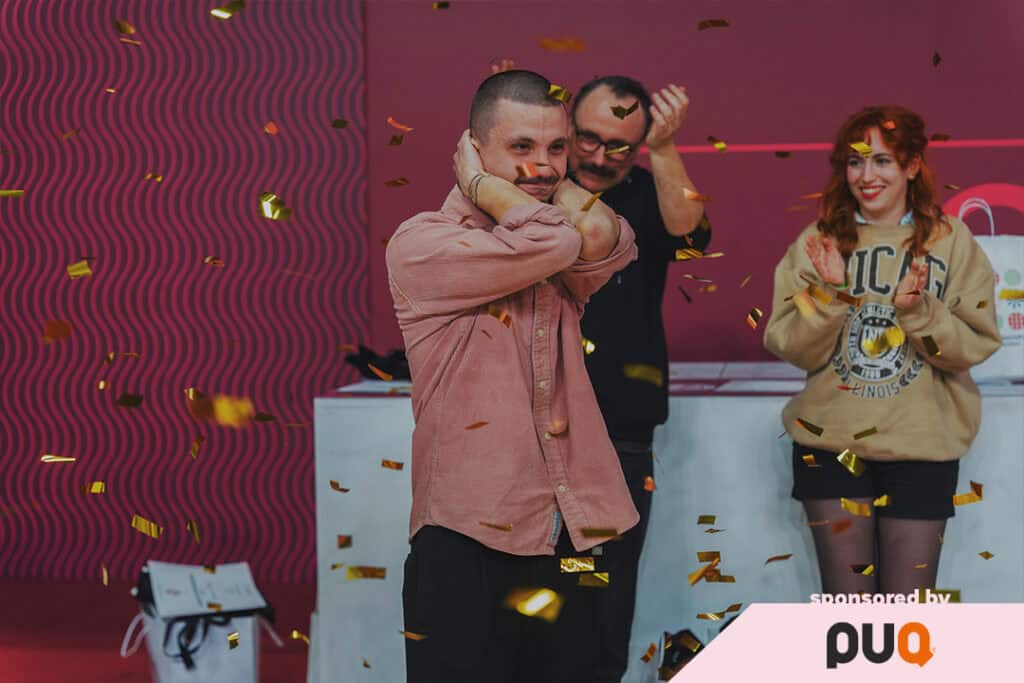
Talal, what is your first memory with coffee?
My earliest vivid memory is of family breakfasts when my grandfather would prepare coffee in a cezve after the meal and pour it into small cups. I probably can’t recall the exact taste or aroma, but I remember the ritual very clearly—the symbiosis of man and process. It always fascinated me. I think that’s when my love for coffee began.
What inspired you to pursue a career in the coffee industry, and how did you get started?
Since childhood, I dreamed of becoming a chef. I cooked at home for family and friends, and always associated my future with gastronomy and the world of food service.
Later, life took me in a direction far from food and coffee, but the inner desire to stay in this field never disappeared. In 2013, I got a job as a waiter at one of Kyiv’s first specialty coffee shops — Chashka.
At that time, I didn’t yet understand what specialty coffee was or why it was important. But the guys behind the bar—Anton and Vova—inspired me. They were part of a world I wanted to understand. I asked to learn, but there were no available spots at the bar, so I moved on to find where I could get a foundation.
Then there were attempts to work in the kitchen, but my heart still leaned toward coffee. I kept asking myself: “What brings you joy?” And I always answered: “Coffee”.
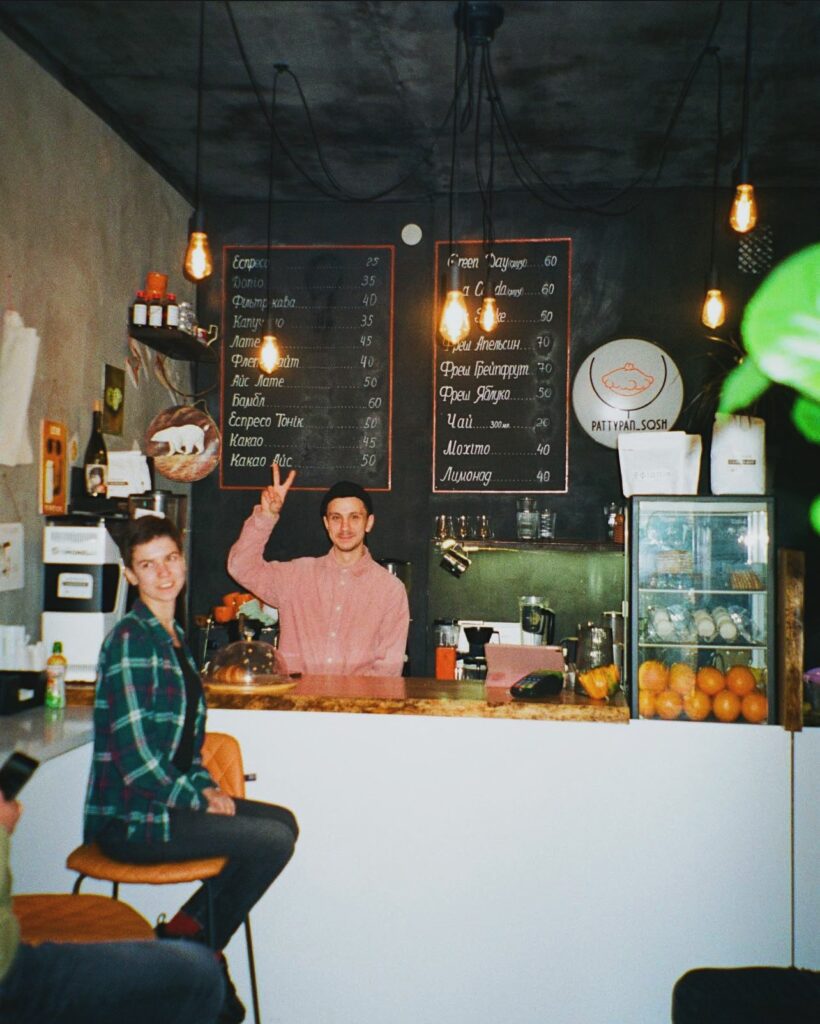
Before the war in Ukraine, my wife and I owned a small coffee and pastry shop in Zhytomyr—pattypan_sqsh. It was the city’s first geeky spot where we consciously didn’t serve Americano or Lungo, aiming to show people that coffee is something more.
After February 24, we gave up—that’s probably the most honest word. It was hard to comprehend how to continue living when each new day was uncertain. We ended up in Italy, without knowledge of the language, in a different culture. At that time, it seemed to me that I had said goodbye to coffee forever.
We know you didn’t give up on coffee! Where do you work nowadays?
But after 2.5 years, I saw an advertisement: Checchi Brunch & Specialty Coffee was looking for a barista. I had already heard about this place and about Gabriele Pezzaioli, who won the national Brewers Cup and represented Italy at the World Stage. I came and I stayed.
I fell in love with Checchi because it’s exactly what we once tried to create at home: the idea, quality, attitude toward the product, whether it’s coffee or food. Now I prepare coffee, delve into roasting, and gradually learn from amazing people. And, of course, I eat incredibly well—thanks to Adriana. I strive to be helpful in a place where I’m loved and appreciated.
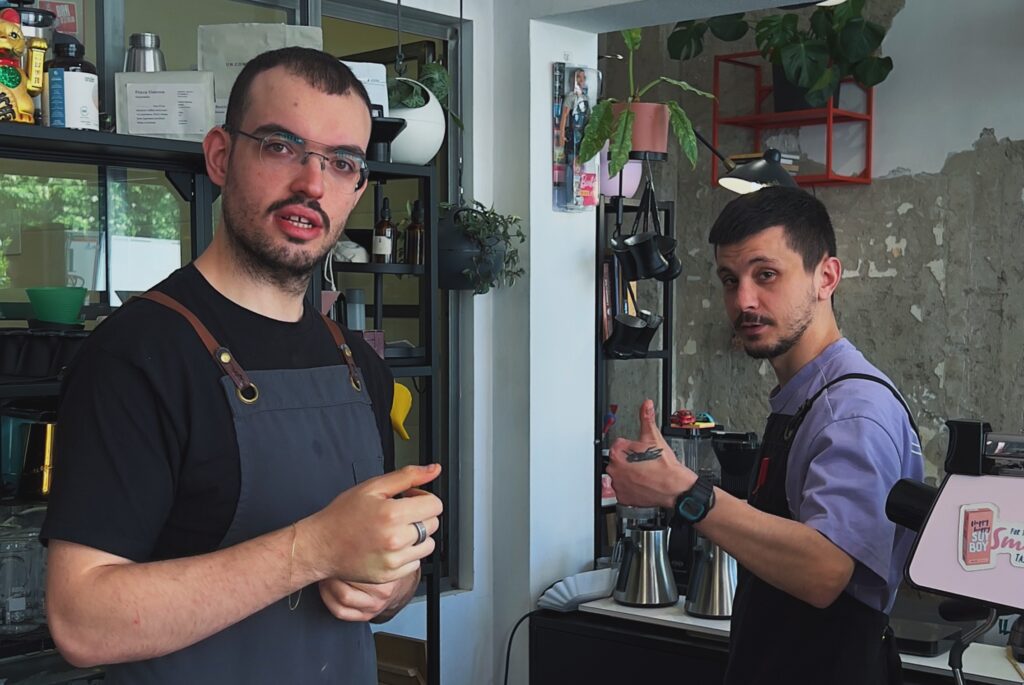
What part of your workday do you enjoy the most and why? Which responsibilities bring you pleasure?
Probably my favourite part of the day is the morning. Preparing for the routine, setting up equipment, the silence before opening—it’s a kind of meditation. I’m not the most talkative person, so this moment when you’re alone with yourself, with coffee, with the first sip and precise TDS measurement, is very valuable to me.
And if we talk about a moment that brings real pleasure, it’s when a guest or colleague says, “Choose yourself. Make something tasty”. Then I go to the freezer, open drawers with unique lots, and the ritual of selection begins—like a mini-championship, only between me and the bean. It’s a special feeling to share something exceptional.
How do you maintain motivation and inspiration to continue developing your coffee-making skills?
Honestly, I’m probably not the brightest example of someone who always maintains motivation. Over all this time—when I left the industry and returned—I lost something, learned something, and realised one important thing: sometimes it’s okay not to be passionate.
Not to achieve. Not to strive. Not to want. That’s also part of you. In such moments, it’s important not to pressure yourself but to simply listen to what’s inside.
If you don’t know what to do — do nothing. Trust yourself and the process. Fate will arrange everything. That’s what helps me return—not through effort, but through honesty with myself.
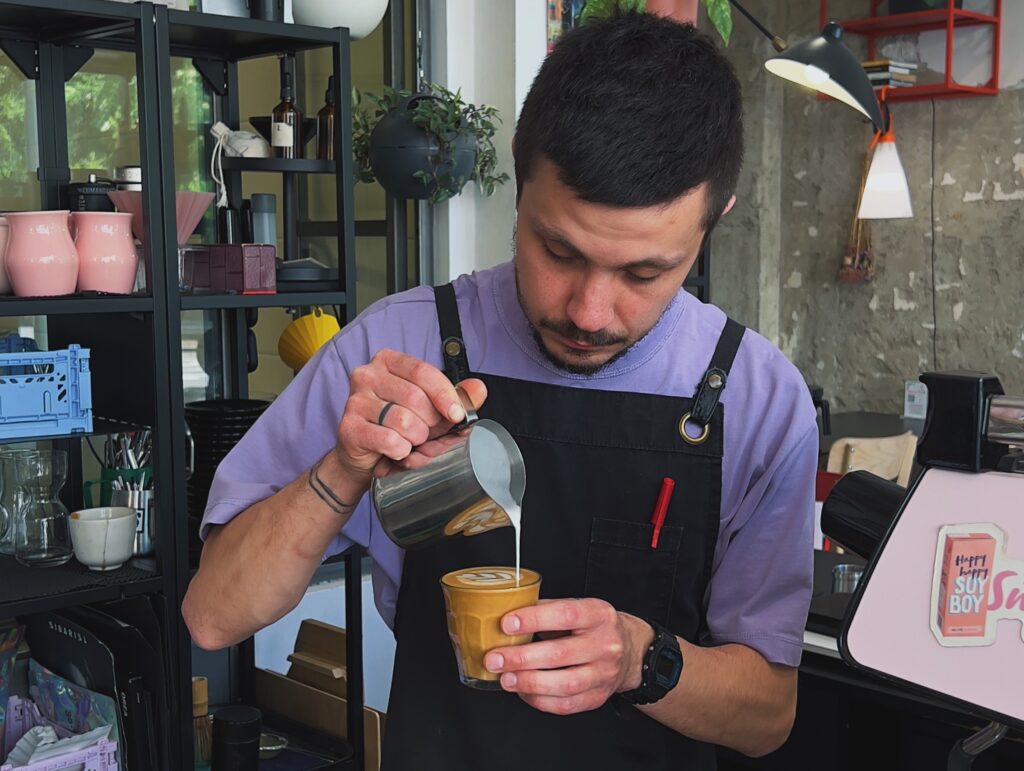
What’s one piece of knowledge about coffee you wish everyone knew?
Coffee is a much more precise product than it might seem at first glance. It’s not just a drink but a journey: from berry to bean, from processing to roasting, from grinding and temperature to water. Each cup is the result of dozens of decisions. And at every stage, from the farm to the dripper, even one small mistake can completely change the taste.
My answer may sound banal, but I truly want everyone to understand: coffee is not just tasty or not tasty. It’s a story. And each cup has its own journey and its own face.
If you could change one thing in the coffee industry today, what would it be and why?
Honestly, I wouldn’t change anything. Development is not about changing one thing, not about prohibitions, and not about slogans. It’s about the ability to accept yourself, your style, your path, and follow it.
And how can I change something externally if someone consciously chose the path of commercial coffee? Or the path of “I don’t learn but pretend I know”? That’s also part of the industry.
I’m definitely not one of those who will shout “specialty in every home”. I just try to do my job honestly and be helpful where I am.
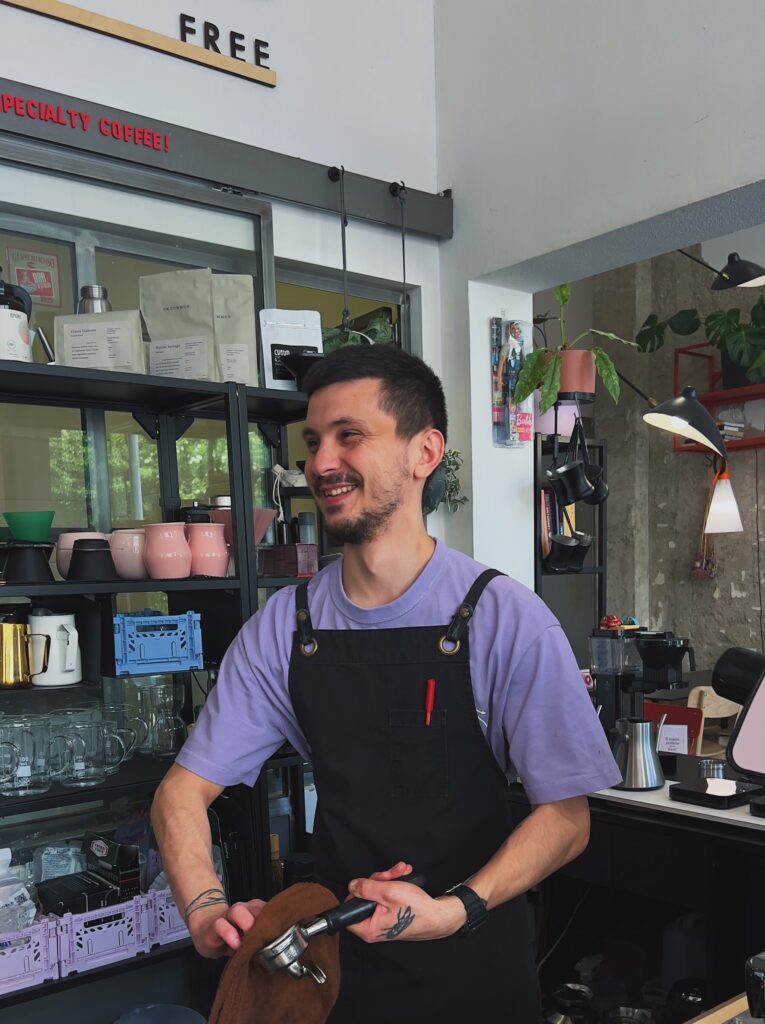
What trends are currently popular in cafes in your region? Are there any that you personally support and would like to see more often elsewhere?
I would like to promote two ideas that I find especially important.
The first is full-scale coffee menus. Not just “we’ve got two types of beans today — one more acidic and one for milk”, but a well-thought-out rotation. A menu allows guests to choose and discover new flavours, and it allows baristas to work with different beans, analyse, and grow. It may not be revolutionary, but in my opinion, it’s the foundation of mindful consumption and professional development.
The second idea is something we call with Gabriele: ‘Barista Breakfast’. It’s a serving format for competition-level beans: one espresso shot as it is and one shot with milk.
It replicates the judging experience in championships, where you taste the coffee both black and in a milk beverage. I think this is a great solution for guests who are curious to explore new flavours but may not be ready to dive straight into filters or high-acidity profiles. It’s educational and — most importantly — delicious.
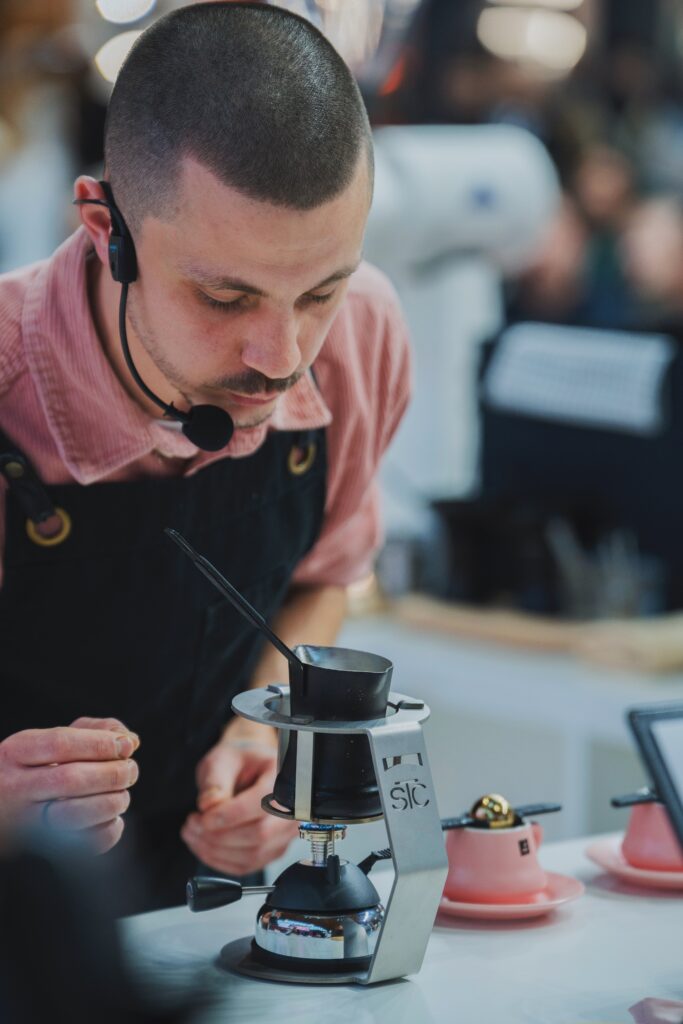
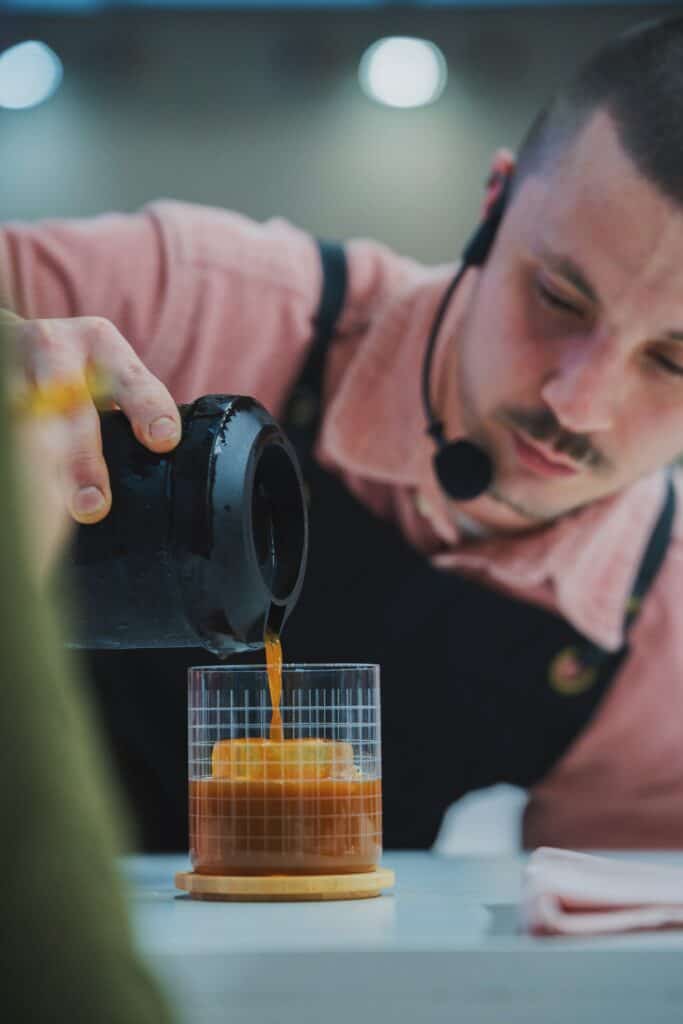
You have amazing achievements in championships. Can you tell us more about them?
Honestly, championships were always something I stayed away from. It was never my dream — I wasn’t “burning” with the idea of competing. And to be honest, I didn’t think my opinion or experience was solid enough to justify stepping on stage.
In my second week working at Checchi, Gabriele jokingly said: “Hey, why don’t you compete in the Ibrik Championship?”. I thought about it for a while… and then I said, why not? I’ll do it — just for fun.
Well… I was very wrong about the “just for fun” part.
Then came the preparation phase, and it wasn’t easy. At one point, I seriously questioned whether I should continue. And that’s when Giorgio — the owner — told me something I’ll never forget:
“Make it a thousand times. On the thousand-and-first time, you won’t even think about it — you’ll just do it”.
Winning the Italian Cezve/Ibrik Championship was not just a professional achievement — it was a personal one. It gave me more confidence and the sense that I actually can do this, even when I doubt myself.
How are you preparing for the World Championship?
For a long time, I was searching — not just for recipes, but for a concept. I wanted to understand what path I want to take, what exactly I want to communicate through a cup of coffee. Now I’ve found that path, and I’m truly happy that it feels honest and reflects my vision. The next two months will be intense: technical practice, working with the coffee, dialling in consistency and flavour, repetitions, and reflection. It requires discipline, but it’s deeply fulfilling.
I’m incredibly grateful to my wife for her constant support. I’m thankful to the entire Checchi team for the environment and trust. And I’m especially grateful to my coach, Gabriele, who shares his knowledge, guides me through every step of preparation, and stands by my side in the most important moments.
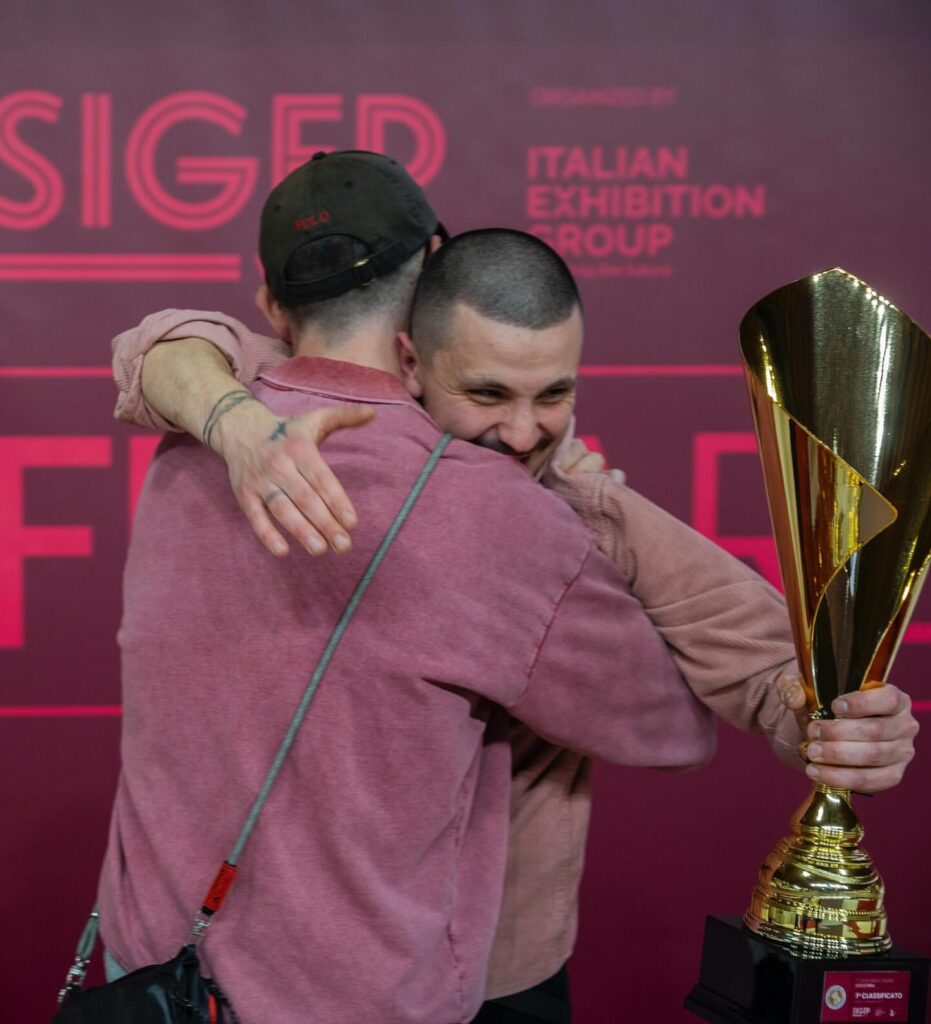
What made you decide to compete in the Cezve/Ibrik Championship? What is so special about brewing coffee in a cezve for you?
At some point, while asking myself the same question, I realised: I finally have something to say. I have experience built up over the years, and I truly want to share it. Not for the title, but because I’m ready to speak through coffee, consciously.
For a long time, I didn’t take cezve seriously. I saw people making it since childhood. I liked watching, but making it myself always felt boring and too slow. Only later did I realise there’s something much deeper in this ritual.
If this doesn’t sound strange, to me, cezve is a way to connect with my ancestors. It’s arguably the most ancient method of brewing coffee, and there’s nothing excessive in it: just you, heat, water, and coffee. You can’t really compare it to anything else. It’s slow, precise, and deeply human.
In your opinion, what’s the most important thing to keep in mind when entering a coffee competition?
First of all, believe in yourself and your abilities. That’s the foundation.
Find something you want to say and show. Let it be genuine, not just something that fits the format.
Work. Train. And trust the process. Everything else will come.
What coffee-related challenges are you looking forward to? Are there any new projects or collaborations?
Right now, I’m fully focused on the upcoming World Championship. On a scale of anticipation, it’s definitely number one. Everything else fades into the background.
As for new projects, I’m involved in GA.PE Coffee Roastery. We’ve just started, but I believe in this project and its potential. My role is still mostly operational: packaging, weighing, and selecting. As I said before, I try to be useful wherever I can.
Working alongside Gabriele Pezzaioli is a great honour. He’s a talented professional with deep knowledge of the coffee industry, and it means a lot to me to be part of the team at such a foundational stage of the roastery’s journey.

Quick Fire Questions for Talal Bitar:
Filter coffee or espresso-based?
Espresso.
Milk coffee or black coffee?
Black.
The most underrated coffee drink?
Filter coffee.
The most underrated coffee brewer?
Cezve / Ibrik.
What brewing method do you use at home?
Pourover.
Favourite barista tool?
A scale.
The number one place in Europe that every coffee geek should visit?
Checchi Brunch & Specialty Coffee in Brescia, Italy
Favourite city outside your own for a coffee tour and why?
Kyiv and Prague. Kyiv is where it all began for me — my first step into the industry. And the way the coffee culture continues to grow there despite the war is truly inspiring. Prague… It just stole my heart at first glance.

